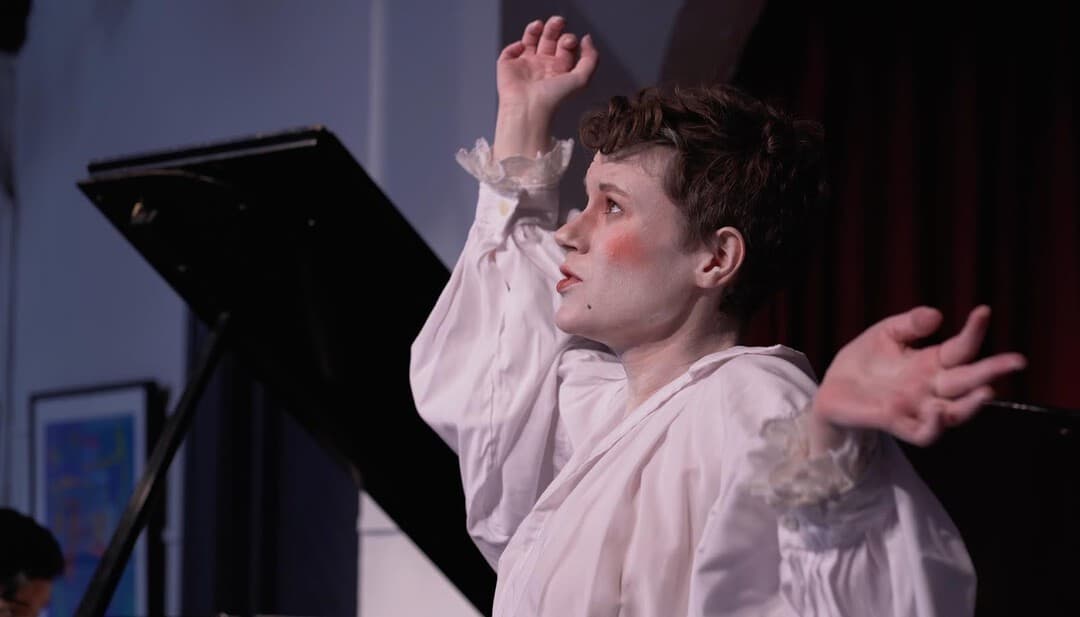Bees wearing eyeliner? A sad clown? Zombies?
You may not expect to see any of these elements in the typical performance of composer George Frideric Handel’s Messiah, but then again, Handel’s Drag Messiah is trying to be anything but typical.
Handel’s Drag Messiah was put on by OperaQ, an independent queer opera company in Toronto. It was sponsored by U of T’s Student Initiative Fund and the Mark S. Bonham Centre for Sexual Diversity Studies, and was available virtually until January 2.
The Varsity sat down with co-founders and co-directors Camille Rogers and Ryan McDonald to discuss the production.
Rogers and McDonald are both current doctoral students in music at U of T, where they met and began conceptualizing the idea for OperaQ. Their first performance was Dido & Belinda, in 2019. “OperaQ really just came from a desire for us to want to be ourselves on stage and to see different stories, different narratives portrayed on the operatic stage,” said Rogers.
The idea for a drag version of the Messiah had been brewing for almost a year. Handel’s Messiah is a very popular oratorio that is typically performed each year around Christmas, meaning most singers come into contact with it at some point. “Messiah is always going to happen,” said Rogers, “but it’s like, how can we make it a little more interesting? A little more inclusive?”
So, the founders started coming up with preliminary ideas, such as the possibility of having a drag pageant with elements of the Messiah. They had initially hoped to host an in-person performance — which they still hope to do at some point in the future — but settled on a scaled-down, COVID-19-friendly version. Their final pre-recorded performance, filmed by videographer Taylor Long, consisted of six different arias from the Messiah, all performed by U of T voice students in drag.
“I think opera and drag go together so well because they’re both so over the top and just about the pageantry and the spectacle,” said Rogers. “There is nothing realist about opera or about drag. It’s all over the top, just totally out there.”
As for the performers, Rogers and McDonald wanted to work with undergraduate voice students at U of T. “We knew they would have almost virtually no experience getting to really be a queer, trans person onstage and have that celebrated,” said McDonald.
They also made sure that all the performers were completely comfortable with what they were doing, something they noted is not always common for professional singers or performers. “We want everything we do to be really artist-led, because something we see in the opera industry is sort of top down hierarchical models — like, the director tells you what to do, and you do it,” explained Rogers. “And so we always really want to do the opposite of that and really have the artists involved in the creative process.”
The performance was hosted by Toronto drag performer Gay Jesus, who also helped the individual performers come up with their own unique drag persona for each number. All the performers went through multiple rounds of consultations, going over elements such as their musical choices, wardrobe, and makeup. Many of the performers also selected pieces that are not typically performed by their voice type.
For example, Rogers, a mezzo-soprano, performed a number typically sung by a bass. Their number featured the lyrics “The trumpet shall sound, and the dead shall be raised.” When creating their character, they realized the lyrics are about “raising people from the dead. And I was like, ‘Well, I have to be a zombie then.’ ”
“I will say that there was no one who was short of creative ideas,” said McDonald. “If anything, we had too many ideas and too many numbers, which I think we knew would happen.”
Up next for OperaQ is the all-digital production Medusa’s Children, an original composition commissioned by the company. McDonald described it as “a mythical mystical queer explosion of epic proportions.”
“It is truly a project people are not going to want to miss,” he added.


